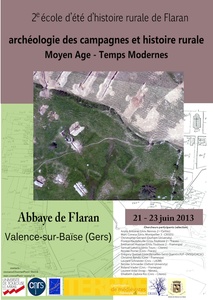RHN 23/2013 | Call
Organiser: Emmanuel Huertas (Univ. Toulouse 2/Cnrs - Framespa) and Marc Conesa (Univ. Montpellier 3 – Crises)
21-23 June 2013, Flaran Abbey, Valence-sur-Baïse, France
Deadline: 15 April 2013
Toulouse University (Le Mirail) and the CNRS, with the support of Association des Journées Internationales d’Histoire de l’Abbaye de Flaran, and the FRAMESPA (UMR 5136), the CRISES Laboratory (EA 4424) and the townhall of Valence-sur-Baïse are organizing the second summer school for rural history.
The summer school will bring together researchers, professors, lecturers, post-doctoral and doctoral students, mainly from France and Europe, all working on aspects of rural history and archaeology of the medieval and modern eras. The organization will cover the principal travel costs and the costs for the duration of the visit. Places are available for doctoral and postdoctoral students. Applications must be sent by April 15th, 2013.
This second summer school for rural history has a dual objective: pedagogical and academic.
- It is aimed in the first instance at junior researchers (doctoral and post-doctoral) from France and elsewhere, who will have the opportunity to present their work and to discuss it with researchers at a more advanced stage. Particular attention will be paid to sources and to their treatment through an interdisciplinary approach.
- This gathering should facilitate dialogue between researchers of different nationalities and with different historiographic perspectives. Less formal than a colloquium and with a friendly atmosphere, the Flaran Summer School seeks to become a focal point for debates and discussions between researchers on a new theme—a theme that obliges us to rethink the very foundations of our historical practices, and in particular of our work as “ruralists” or “rural environmental historians”. Comparative thinking and exchange between medievalists and modernists, historians and archaeologists will be at the heart of the event.
The theme chosen for this 2013 edition of the Rural History Summer School (“Rural Archaeology and Rural History – Middle Ages – Modern era”) will allow us to consider the relationship between rural archeology and history. More than the oppositions, it seems it is the relationships, the combinations and the intertwining of disciplines, that need to be questioned through the different scientific traditions in Europe (England, Germany, Belgium, Spain, France, Italy). This European overview will be the major focus of this 2013 summer school. The emphasis will also be put on the recent development of post-medieval archaeology, practiced in England and Italy for example, but still embryonic in several European countries. The interrogations will dwell on rescue and commercial Archeology and on its methods and results.
Visiting scholars
- Annie Antoine (Univ. Rennes 2 – Cerhio)
- Marc Conesa (Univ. Montpellier 3 – Crises)
- Christopher Gerrard (Durham University)
- Florent Hautefeuille (Univ. Toulouse 2 – Traces)
- Emmanuel Huertas (Univ. Toulouse 2/Cnrs – Framespa)
- Samuel Leturcq (Univ. Tours – Citeres)
- Nicolas Poirier (Cnrs –Traces)
- Christine Rendu (Cnrs – Framespa)
- Laurent Schneider (Cnrs – La3m)
- Nicolas Schroeder (Oxford University)
- Grégory Quenet (Univ. Versailles-Saint-Quentin/IUF – OVSQ/CHCSC)
- Roland Viader (Cnrs – Framespa)
- Laurent Vidal (Inrap - Nîmes)
- Elisabeth Zadora-Rio (Cnrs – Citeres)
Structure of the Conference: The days will be structured around three sessions (two in the morning and one in the afternoon). The junior researchers will be invited to present their work and their sources during certain sessions. The working languages will be English and French.
Registration details: Places are available for junior doctoral or post-doctoral researchers. Preferred research themes are the rural history and archaeology of “rural spaces” in a broad sense. The period in question is 500 - ca. 1800. (without restrictions). Given that the working languages are English and/or French, participants must have a basic knowledge of these two languages (participants can express themselves in whichever language they choose). Participants will be asked to give a presentation of their researches. The organization will cover travel costs (up to €150 for France ; €250 out of France) and the costs for the duration of the visit.
Given that there are a limited number of places, candidates should send an application containing: 1. a comprehensive CV, 2. a presentation of their written or archaeological sources (2 pages). Applications must be sent by April 15th, 2013. A response will be sent on May 1st, 2012.
Contact: Dr. Emmanuel Huertas (Univ. Toulouse 2 /CNRS) ; Dr. Marc Conesa (University of Montpellier 3)
